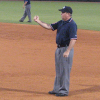- 0
Infield Fly Rule
Umpire-Empire locks topics which have not been active in the last year. The thread you are viewing hasn't been active in 1842 days so you will not be able to post. We do recommend you starting a new topic to find out what's new in the world of umpiring.
-
Similar Content
-
- 29 replies
- 7,605 views
-
- 0 replies
- 746 views
-
- 1 reply
- 826 views
-
- 19 answers
- 2,615 views
-
Infield Fly Discussion on MLB Network 1 2
By Thunderheads,
- infield fly rule
- mlb network
- (and 2 more)
- 29 replies
- 2,867 views
-




Question
Guest Pecosbill
When first and second, or first second and third are occupied and there’s less than two out and the batter hits an infield pop up, easily catchable: is the umpire required to VERBALLY announce the “Infield fly rule, batter’s out” or can he just signal it by put in his hand in the air? I always thought it was the former, but when the situation happened in our MSBL league the umpires insisted that they are not required to verbally announce the rule applicable. But without the umpire verbally announcing it, how are the players, who are keeping their eyes on the ball, supposed to know what has been called?
Link to comment
Share on other sites
Top Posters For This Question
10
8
4
3
Popular Days
Apr 1
24
Mar 31
6
Apr 2
2
Top Posters For This Question
johnnyg08 10 posts
beerguy55 8 posts
catsbackr 4 posts
Senor Azul 3 posts
Popular Days
Apr 1 2019
24 posts
Mar 31 2019
6 posts
Apr 2 2019
2 posts
Popular Posts
johnnyg08
The umpires were correct. The players are responsible for knowing the situation. The players should listen to their coaches. The situation dictates IFF, not the call.
beerguy55
The rule doesn't require the umpire to judge a player's intent to catch a ball - just that it could/should be caught with ordinary effort. The pitcher could have caught it with ordinary effort - does
maven
You're not thinking of the rule correctly. The condition for IFF is that the ball CAN be caught with ordinary effort. That judgment should take level of play and general weather conditions (esp.
31 answers to this question
Recommended Posts